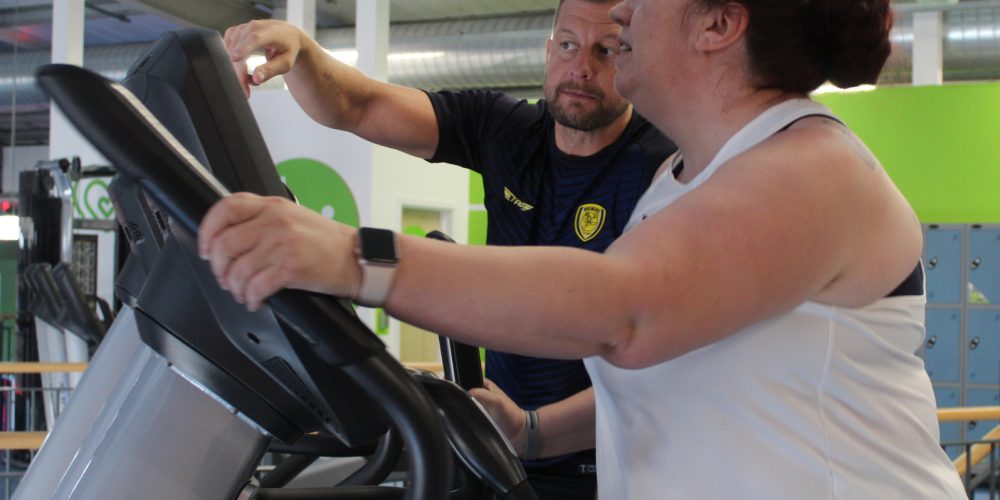Researchers at Birmingham City University have joined forces with Burton Albion Community Trust to help people struggling with long-Covid symptoms improve their health and regain their fitness.
Sports exercise scientists from the University have teamed up with fitness coaches from the English Football League One Club’s Community Trust to design, deliver and monitor the effectiveness of an exercise rehabilitation programme on long-Covid symptoms and recovery.
The long-Covid recovery and rehabilitation programme is part of a pilot project being trialled in four locations across Staffordshire and involving local sports and wellbeing charity Together Active and the Midlands Partnership NHS Foundation Trust as well as the Gym Group who have kindly provided their facilities.
Long-Covid is where symptoms associated with Covid such as breathing difficulties, tiredness and fatigue, memory loss, brain fog, fever, poor appetite, amongst other symptoms continue for 12 weeks after initial infection. The condition is reported to , but the range and severity of symptoms can vary greatly among those affected.
To help tackle the burden that ongoing Covid symptoms is continuing to place on the healthcare system, the NHS has invested £10 million across the UK into local health services. The Birmingham City University and Burton Albion Community Trust initiative is one such programme and will focus on people with lower levels of need but still requiring support with self-care, rather than those with medically complex or deteriorating conditions.
Dr Lewis Gough, Senior Lecturer in Sport and Exercise at Birmingham City University, is heading up the study. He said:
“We know that long-Covid can have a seriously debilitating effect on fitness levels among people who previously didn’t do much exercise but also among those who led very healthy, active lifestyles. We’ll be working with both categories to assess the impact long-Covid has had and to tailor exercise programmes accordingly to get them back on the road to recovery.”
Lewis’s research team, which includes doctoral researcher Steven Rimmer who is working a dual role with Burton Albion, as a sports scientist for Burton Albion’s first team and Health and Well-being Manager for Burton Albion Community Trust, alongside their qualified fitness coaches, has recruited the first cohort of 12 participants to the programme.
Patients have been referred by clinicians from the Midlands Partnership NHS Foundation Trust and among those taking part are primary school teachers, child carer, health worker, property developer, mine worker, paediatrics nurse, and retired, semi-retired individuals.
Following an initial assessment around baseline measurements like lung capacity, levels of oxygen in the blood, resting heat rate and blood pressure, Steven and his colleagues will put together a 12-week personalised physical activity plan for each participant. The activity plans will be designed with each individual and adapted accordingly depending on fitness levels and personal goals, but all will typically include a combination of aerobic, stability and mobility, and strength-based exercise.
The sessions will be delivered twice weekly at local gym-based settings with opportunities to also train at Burton Albion’s fitness suite at their home ground, their Pirelli Stadium, and while the main objective of the programme is to improve the fitness levels of those taking part, the team hope it will have wider social and community benefits.
Researcher Steven Rimmer explained:
“Long-Covid can have an impact on mental health as well as physical wellbeing. Sufferers can sometimes feel down at being unable to do the things they used to quite comfortably, or theystruggle physically to get out and about and socialise as much as they’d like, and this in turn can lead to feelings of loneliness and isolation. Additionally, we are seeing people feeling anxious and depressed over finances due to being unable to work owing to their Long Covid condition.
“So, as well as improving their fitness, we hope those on the programme will get a psychological and social boost too.”
Midlands Partnership NHS Foundation Trust and Together Active will evaluate participants after the completion of the initial 12-week pilot phase and, where appropriate, in consultation with Steven and his colleagues, will connect them to further community-based fitness and wellbeing programs.
John Widdowson, Community Manager at Burton Albion Community Trust, added:
“We know the strain that Covid has put on the NHS, but we believe that we can alleviate this by placing patients into the care of dedicated and well-qualified sports and healthcare professionals within the local community. We’re pleased to be involved in measuring and evidencing the impact of such an important piece of work.”
Plans are in place to recruit further participants to the study over the next 12 months. Further details, including information on who can take part are available at Long Covid Recovery and Rehabilitation | Burton Albion Community Trust or email Steve.rimmer@












